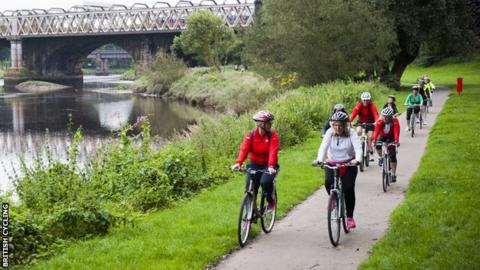
Nearly three quarters of a million more UK women have taken up cycling since 2013, according to British Cycling.
Three times as many men rode bikes regularly as women in 2013, leading to the #WeRide initiative to get one million more women cycling by 2020.
“Four years on, I am pleased to say that the sport is in a different place,” said new British Cycling chief executive Julie Harrington.
She now wants stakeholders to work together to keep women cycling.
Dame Sarah Storey – Britain’s most successful Paralympian – said improvements in road safety could help.
“It’s one of the main barriers preventing women from cycling,” she said.
“It is crucial that politicians and decision makers take on board safety concerns, and ensure that our roads are appealing, safe shared spaces that can be used conveniently by all road users, regardless of their chosen method of transport.”
The target of one million more women riding by 2020 was seen as highly ambitious four years ago.
“We were almost laughed out of the room,” said Harrington.
“This itself was proof of the entrenched view of cycling as a sport for men.
“Our perseverance across all areas – from encouraging clubs to offer women-only sessions to training 70% more female coaches – is paying off.”
Wider gains for women
As well as the top-line figure of 723,000 more women taking up cycling, the report cites a wide range of advances for women in cycling since 2013:
- More than 150,000 female attendances at Breeze Bike rides, British Cycling’s female-only rides programme
- Almost 500 clubs across the country now offer women-only sessions
- Number of trained female coaches is up 70%
- Female race licence holders is up 72%
- British Cycling’s female membership has doubled
- Three women now sit on British Cycling’s Board of Directors
Interest has been helped by increased visibility and success at elite levels – British women have won more than 20 world titles since 2013 and claimed 10 Olympic and Paralympic cycling titles at Rio 2016.
But sustained gains are dependent on retention of those new riders.
“We need to better understand just why women drop off,” added Harrington.
“This isn’t something we can tackle alone – we’ll need the support of sports bodies, cycling and transport organisations, national and local government, and the media. But we are determined to crack it.”
If you want to take part in British Cycling’s women-only Breeze Bike ride programme, you can find sessions near you with the Get Inspired Activity Finder.
Or if you want to find out more about getting into cycling, check out our inclusive Get Inspired guide.



